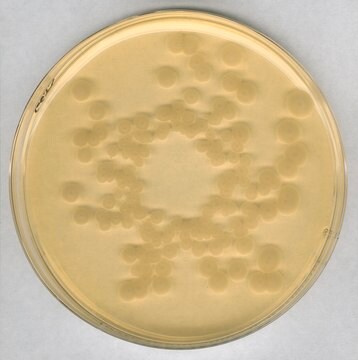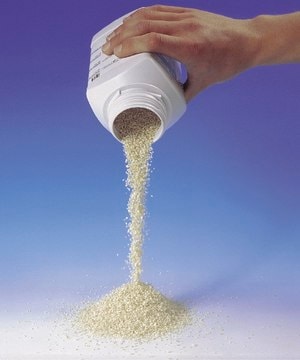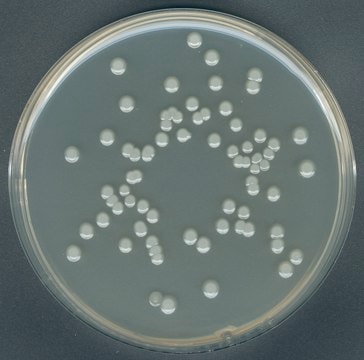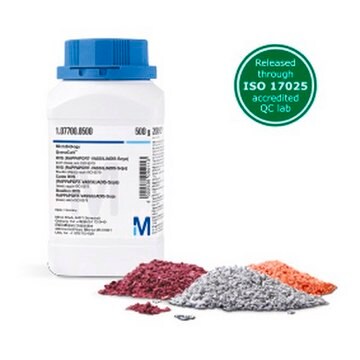1.03915
® Agar żelazowy z potrójnym cukrem
pkg of 500 g, for Enterobacter spp., for Salmonella spp., for Shigella spp., degradation of sugar and accompanying acid production is detected by the pH indicator phenol red
Synonim(y):
Agar TSI
About This Item
Polecane produkty
agency
AOAC®
EP
FDA-BAM
USP
Poziom jakości
sterylność
non-sterile
Formularz
granular
opakowanie
pkg of 500 g
producent / nazwa handlowa
GranuCult® prime
metody
microbe id | utilization test: suitable
microbiological culture: suitable
pH
7.4 (37 °C, 65 g/L in H2O, after autoclaving)
rozpuszczalność
65 g/L
gęstość nasypowa
650 kg/m3
Zastosowanie
food and beverages
microbiology
temp. przechowywania
15-25°C
przydatność
Citrobacter spp.
Enterobacter spp.
Escherichia coli
Klebsiella spp.
Proteus spp.
Salmonella spp.
Shigella spp.
coliforms
enterobacteriaceae
Opis ogólny
Zastosowanie
Cechy i korzyści
- Bezpieczny i zrównoważony dzięki zmniejszonemu ryzyku związanemu z wdychaniem drobnego pyłu i substancji toksycznych, co skutkuje bezpieczniejszym środowiskiem pracy.
- Doskonała zwilżalność, rozpuszczalność i sypkość
- Wygodny, z minimalną separacją składników i zbrylaniem, nawet w ciepłych lub wilgotnych warunkach
- Wysoka powtarzalność między partiami
- Wydłużony okres trwałości do pięciu lat
- Duża liczba szczepów testowych przekraczająca wszystkie wymagania regulacyjne
- Technologia granulacji umożliwiająca dodawanie wielu suplementów, bez konieczności dodawania ich oddzielnie
Komentarz do analizy
Wygląd (kolor): czerwony
Wartość pH (25 °C): 7.2 - 7.6
Wzrost (Escherichia coli ATCC 25922 (WDCM 00013)): dobry do bardzo dobrego
Wzrost (Citrobacter freundii ATCC 8090): dobry do bardzo dobrego
Wzrost (Enterobacter cloacae ATCC 13047 (WDCM 00083)): dobry do bardzo dobrego
Wzrost (Shigella flexneri ATCC 12022 (WDCM 00126)): dobry do bardzo dobrego
Wzrost (Salmonella typhimurium ATCC 14028 (WDCM 00031)): dobry do bardzo dobrego
Wzrost (Salmonella enteritidis ATCC 13076 (WDCM 00030)): dobry do bardzo dobrego
Wzrost (Proteus mirabilis ATCC 14153): dobry do bardzo dobrego
Wzrost (Proteus hauseri ATCC 13315): dobry do bardzo dobrego
Butt (Escherichia coli ATCC 25922 (WDCM 00013)): żółty
Butt (Citrobacter freundii ATCC 8090): żółty/czarny
Butt (Enterobacter cloacae ATCC 13047 (WDCM 00083)): żółty
Butt (Shigella flexneri ATCC 12022 (WDCM 00126)): żółty
Butt (Salmonella typhimurium ATCC 14028 (WDCM 00031)): żółty/czarny
Butt (Salmonella enteritidis ATCC 13076 (WDCM 00030)): żółty/czarny
Butt (Proteus mirabilis ATCC 14153): żółty/czarny
Butt (Proteus hauseri ATCC 13315): żółty/czarny
Slant surface (Escherichia coli ATCC 25922 (WDCM 00013)): żółty
Slant surface (Citrobacter freundii ATCC 8090): żółty
Powierzchnia skośna (Enterobacter cloacae ATCC 13047 (WDCM 00083)): żółty
Powierzchnia skośna (Shigella flexneri ATCC 12022 (WDCM 00126)): czerwony
Powierzchnia skośna (Salmonella typhimurium ATCC 14028 (WDCM 00031)): czerwony
Powierzchnia skośna (Salmonella enteritidis ATCC 13076 (WDCM 00030)): czerwony
Powierzchnia skośna (Proteus mirabilis ATCC 14153): czerwony/czarny
Powierzchnia skośna (Proteus hauseri ATCC 13315): żółty
Inkubacja: 24 godz.35 °C; tlenowa.
Przypis
The designations basic, plus, or prime are added to indicate the quality control level, from basic quality control to standard QC plus to prime for full regulatory compliance.
Informacje prawne
Kod klasy składowania
11 - Combustible Solids
Klasa zagrożenia wodnego (WGK)
WGK 3
Certyfikaty analizy (CoA)
Poszukaj Certyfikaty analizy (CoA), wpisując numer partii/serii produktów. Numery serii i partii można znaleźć na etykiecie produktu po słowach „seria” lub „partia”.
Masz już ten produkt?
Dokumenty związane z niedawno zakupionymi produktami zostały zamieszczone w Bibliotece dokumentów.
Produkty
Shigella spp. are predominantly connected to humans and are rarely isolated from other animals, with the exception of primates.
Technical article on Cultivation of Shigella
Protokoły
Norma EN ISO 6579-1 określa wykrywanie Salmonella spp. w próbkach przeznaczonych do spożycia przez ludzi, paszach dla zwierząt i próbkach środowiskowych.
Specifies a horizontal method for the detection of Salmonella spp. in the food production chain.
Nasz zespół naukowców ma doświadczenie we wszystkich obszarach badań, w tym w naukach przyrodniczych, materiałoznawstwie, syntezie chemicznej, chromatografii, analityce i wielu innych dziedzinach.
Skontaktuj się z zespołem ds. pomocy technicznej








